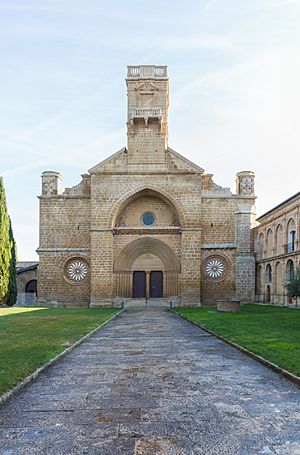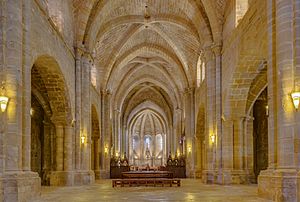Santa María de la Oliva facts for kids
Quick facts for kids Santa María de la Oliva |
|
|---|---|
| Native name Spanish: Ex-monasterio Cisterciense de Santa María de la Oliva |
|
 |
|
| Location | Carretera Melinda, s/n, 31310 Carcastillo, Navarre, Spain |
| Architectural style(s) | Cistercian |
| Official name: Ex-monasterio Cisterciense de Santa María de la Oliva | |
| Type | Non-movable |
| Criteria | Monument |
| Designated | 1880 |
| Reference no. | RI-51-0000026 |
| Lua error in Module:Location_map at line 420: attempt to index field 'wikibase' (a nil value). | |
The Santa María la Real de la Oliva Abbey, often called La Oliva, is a special Cistercian monastery located in Carcastillo, Navarre, Spain. A monastery is a place where monks or nuns live and worship.
This abbey is a great example of Cistercian architecture, which is a simple and strong style of building. Its buildings have been protected since 1880 because they are so important. Today, it's known as a Bien de Interés Cultural, which means it's a very important cultural site in Spain. In the region of Navarre, there are many Cistercian monasteries, like Fitero, Tulebras, and Iranzu, and La Oliva is one of them.
Exploring La Oliva Abbey
This Cistercian Monastery was first started in the 12th century, which means it's over 800 years old! The buildings you see today were mostly built between the 13th and 15th centuries.
The church inside is very large and shows the early style of Cistercian art in Spain. It's known for being simple yet powerful. The abbey also has a beautiful cloister, which is an open courtyard surrounded by covered walkways. This cloister is built in the Gothic style. There's also a chapter house, where the monks would meet, and a special chapel called Saint Jesus Christ. All these parts show how important and artistic this monastery was.
A Look at History
The building of this site is said to have begun in 1134. This was under King García Ramírez of Navarre, who was sometimes called the restorer.
King García Ramírez passed away in 1150. In that same year, the abbey was officially founded, or perhaps re-established. It became a "daughter house" of two other important abbeys: Morimond and Escaladieu. This means it was like a new branch or extension of those older monasteries.
Later, after the monastery was no longer used by monks, a large altarpiece (a piece of art behind the altar) was moved from La Oliva to a town called Tafalla.
See also
 In Spanish: Monasterio de Santa María la Real de la Oliva para niños
In Spanish: Monasterio de Santa María la Real de la Oliva para niños
External links
- Official website: http://www.monasteriodelaoliva.org/
 | Misty Copeland |
 | Raven Wilkinson |
 | Debra Austin |
 | Aesha Ash |


